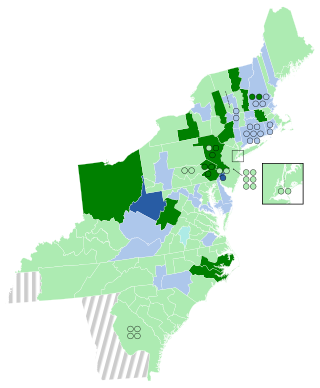Massachusetts


Massachusetts law required a majority for election, necessitating additional trials in three districts.
| District | Incumbent | Party | First elected | Result | Candidates |
|---|---|---|---|---|---|
| Massachusetts 1 Known as the 1st Western District | Vacant | Incumbent representative-elect Theodore Sedgwick (Federalist) resigned sometime in June 1796 to become U.S. Senator. Democratic-Republican gain. | √ Thomson J. Skinner (Democratic-Republican) 56.4% Ephraim Williams (Federalist) 43.6% | ||
| Massachusetts 2 Known as the 2nd Western District | William Lyman | Democratic-Republican | 1792 | Incumbent lost re-election. New member elected. Federalist gain. | First ballot(November 7, 1796): William Shepard (Federalist) 46.3% Sam Hinshaw 23.9% William Lyman (Democratic-Republican) 21.4% John Williams 4.0% Nahum Park 2.0% Scattering 2.4% Second ballot(January 16, 1797): √ William Shepard (Federalist) 100% |
| Massachusetts 3 Known as the 3rd Western District | Samuel Lyman | Federalist | 1794 | Incumbent re-elected. | √ Samuel Lyman (Federalist) 83.3% Daniel Bigelow (Democratic-Republican) 16.7% |
| Massachusetts 4 Known as the 4th Western District | Dwight Foster | Federalist | 1792 | Incumbent re-elected. | √ Dwight Foster (Federalist) 80.8% Levi Lincoln Sr. (Democratic-Republican) 19.2% |
| Massachusetts 5 Known as the 1st Southern District | Nathaniel Freeman | Democratic-Republican | 1794 | Incumbent re-elected. | √ Nathaniel Freeman (Democratic-Republican) 82.1% Peleg Coffin Jr. (Federalist) 17.9% |
| Massachusetts 6 Known as the 2nd Southern District | John Reed Sr. | Federalist | 1794 | Incumbent re-elected. | √ John Reed Sr. (Federalist) 78.8% Edward H. Robbins (Federalist) 21.2% |
| Massachusetts 7 Known as the 3rd Southern District | George Leonard | Federalist | 1788 1794 | Incumbent retired. New member elected. Federalist hold. | First ballot(November 7, 1796): Elisha May (Federalist) 45.3% Stephen Bullock (Federalist) 28.3% Laban Wheaton (Federalist) 26.4% Second ballot(January 16, 1797): Stephen Bullock (Federalist) 35.8% Laban Wheaton (Federalist) 32.7% Elisha May (Federalist) 31.5% Third ballot(April 3, 1797): √ Stephen Bullock (Federalist) 56.7% Elisha May (Federalist) 28.3% Laban Wheaton (Federalist) 15.1% |
| Massachusetts 8 Known as the 1st Middle District | Fisher Ames | Federalist | 1788 | Incumbent retired. New member elected. Federalist hold. | √ Harrison Gray Otis (Federalist) 57.0% James Bowdoin (Democratic-Republican) 43.0% |
| Massachusetts 9 Known as the 2nd Middle District | Joseph Varnum | Democratic-Republican | 1794 | Incumbent re-elected. | √ Joseph Varnum (Democratic-Republican) 69.0% Ebenezer Bridge (Federalist) 16.8% Samuel Dexter (Federalist) 14.3% |
| Massachusetts 10 Known as the 3rd Middle District | Vacant | Predecessor Benjamin Goodhue (Federalist) resigned sometime in June 1796 to become U.S. Senator. New member elected. Federalist gain. Winner was also elected to finish the current term, see below. | √ Samuel Sewall (Federalist) 67.9% Loammi Baldwin (Federalist) 22.1% | ||
| Massachusetts 11 Known as the 4th Middle District | Theophilus Bradbury | Federalist | 1794 | Incumbent re-elected. | √ Theophilus Bradbury (Federalist) 100% |
| Massachusetts 12 Known as the 1st Eastern District of the District of Maine | Henry Dearborn | Democratic-Republican | 1792 | Incumbent lost re-election. New member elected. Federalist gain. | First ballot(November 7, 1796): Isaac Parker (Federalist) 40.5% Henry Dearborn (Democratic-Republican) 31.7% John Bowman 27.8% Second ballot(January 16, 1797): Isaac Parker (Federalist) 48.2% Henry Dearborn (Democratic-Republican) 33.8% John Bowman 18.0% Third ballot(April 3, 1797): √ Isaac Parker (Federalist) 52.6% Henry Dearborn (Democratic-Republican) 47.5% |
| Massachusetts 13 Known as the 2nd Eastern District of the District of Maine | Peleg Wadsworth | Federalist | 1792 | Incumbent re-elected. | √ Peleg Wadsworth (Federalist) 100% |
| Massachusetts 14 Known as the 3rd Eastern District of the District of Maine | George Thatcher | Federalist | 1788 | Incumbent re-elected. | √ George Thatcher (Federalist) 100% |








